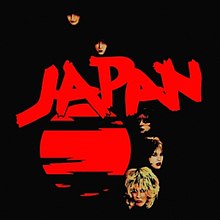Adolescent Sex
| Adolescent Sex | ||||
|---|---|---|---|---|
 | ||||
| Studio album by | ||||
| Released | March 1978 | |||
| Recorded | Late 1977 | |||
| Genre | ||||
| Length | 47:24 | |||
| Label | Hansa | |||
| Producer | Ray Singer | |||
| Japan chronology | ||||
| ||||
| Singles from Adolescent Sex | ||||
| ||||
Adolescent Sex is the debut album by the English band Japan, released in March 1978 by record label Hansa.[6] To avoid controversy over the title, the album was renamed simply as Japan in some countries.
Content
[edit]According to AllMusic, Adolescent Sex "snarls with leftover punk intent, a few glam rock riffs, and a wealth of electronics that not only reach back to the band's youth, but also predate much of what would explode out of the next wave of British underground."[6]
Release
[edit]Though not a commercial success in their native UK, the album was better received abroad, particularly in Japan itself, where it peaked at No. 20,[7] and in the Netherlands where the single "Adolescent Sex" reached number 27 in the Dutch Top 40 in 1979.[8]
The Japanese release contained several mistranslations of song titles. "Transmission" became "Invitation to Fascination", "Suburban Love" became "Carousel of Love", and "Television" became "Temptation Screen".
The album was remastered and re-released as a digipak CD in April 2004, with four videos as bonus material.
Reception and aftermath
[edit]| Review scores | |
|---|---|
| Source | Rating |
| AllMusic | |
| Encyclopedia of Popular Music | |
| Trouser Press | unfavourable[10] |
Trouser Press wrote that the album "introduces Japan in all its guitar-rock misery, playing such Bowie-influenced tripe as 'Wish You Were Black' with less style than a sense of urgency".[10] AllMusic retrospectively gave the album a 4.5 out of 5 grade, writing: "A more exciting album than just about anything else they'd ever record, Japan were young, hungry, and more than a little rough around the edges."[6]
Within a couple of years of its release, the band publicly denounced the album.
"The band were not totally happy with the first album or the way it had been marketed, and were dismayed by its poor reception in the UK. Their record company were not that ecstatic with the British sales either and required another album, this time aimed at the lucrative US and European markets."
— Paul Rymer[11]
David Sylvian also said in 1982:
"I regret the first album, 'Adolescent Sex', in the sense that we were too young, too naive to make it. The people around us should have realised that and not had it released. The second album is okay as a first album."[12]
Track listing
[edit]All tracks are written by David Sylvian, except for "Don't Rain on My Parade" by Jule Styne and Bob Merrill
| No. | Title | Length |
|---|---|---|
| 1. | "Transmission" | 4:46 |
| 2. | "The Unconventional" | 3:02 |
| 3. | "Wish You Were Black" | 4:49 |
| 4. | "Performance" | 4:36 |
| 5. | "Lovers on Main Street" | 4:09 |
| 6. | "Don't Rain on My Parade" | 2:54 |
| No. | Title | Length |
|---|---|---|
| 7. | "Suburban Love" | 7:27 |
| 8. | "Adolescent Sex" | 3:46 |
| 9. | "Communist China" | 2:44 |
| 10. | "Television" | 9:15 |
| No. | Title | Length |
|---|---|---|
| 11. | "Don't Rain on My Parade" (video) | |
| 12. | "Communist China" (video) | |
| 13. | "Adolescent Sex" (video) | |
| 14. | "Adolescent Sex" (rare alt. video) |
Personnel
[edit]- Japan
- David Sylvian – lead vocals, rhythm guitar
- Rob Dean – lead guitar, backing vocals
- Richard Barbieri – keyboards, backing vocals
- Mick Karn – bass, backing vocals
- Steve Jansen – drums, backing vocals, percussion
- Additional personnel
- Ray Singer – production, additional backing vocals
- Pete Silver – engineering
- Dick Whitbread – cover design and artwork
- Graham Hughes – cover photo
Charts
[edit]Album
[edit]| Year | Chart | Peak position |
|---|---|---|
| 1978 | Japanese Oricon Albums Chart | 20[7] |
Singles
[edit]| Year | Single | Chart | Peak position |
|---|---|---|---|
| 1979 | Adolescent Sex | Dutch Top 100 | 21[13] |
| Belgium (Flanders) Ultratop | 28[14] |
References
[edit]- ^ Terich, Jeff (22 February 2012). "10 Essential New Romantic Albums". Treble. Retrieved 4 December 2019.
Having begun life as a trashy glam rock band with Adolescent Sex (a name we should all feel guilty Googling),
- ^ Ham, Robert (9 March 2021). "Japan - Quiet Life". Pitchfork. Retrieved 6 August 2023.
- ^ Reynolds, Simon (1 January 2005). "Electric Dreams: Synthpop". Rip It Up and Start Again: Postpunk 1978-1984. Faber & Faber. p. 336. ISBN 0-571-21570-X. Retrieved 17 December 2024.
- ^ Galens, David (1998). "Japan/Rain Tree Crow/Mick Karn/Polytown". In Graff, Gary; Durchholz, Daniel (eds.). MusicHound Rock: The Essential Album Guide. Detroit: Visible Ink Press. p. 594.
- ^ "Music Week" (PDF). p. 31.
- ^ a b c d Hanson, Amy. "Adolescent Sex – Japan | Songs, Reviews, Credits, Awards | AllMusic". AllMusic. Retrieved 20 July 2015.
- ^ a b Oricon Album Chart Book: Complete Edition 1970–2005. Roppongi, Tokyo: Oricon Entertainment. 2006. ISBN 4-87131-077-9.
- ^ "Nederlandse Top 40 – week 10, 1979 (Dutch)". Retrieved 21 July 2010.
- ^ Larkin, Colin (2011). The Encyclopedia of Popular Music (5th concise ed.). Omnibus Press.
- ^ a b Robbins, Ira; Aswad, Jen. "TrouserPress.com :: Japan". Trouser Press. Retrieved 3 October 2015.
- ^ Paul Rymer, liner notes, Obscure Alternatives, SONY BMG (2006)
- ^ "Smash Hits magazine November 25 - December 8, 1982 page 10".
- ^ "Top 100".
- ^ "Japan - Adolescent Sex". ultratop.be. Retrieved 3 April 2019.
External links
[edit]- Adolescent Sex at Discogs (list of releases)
